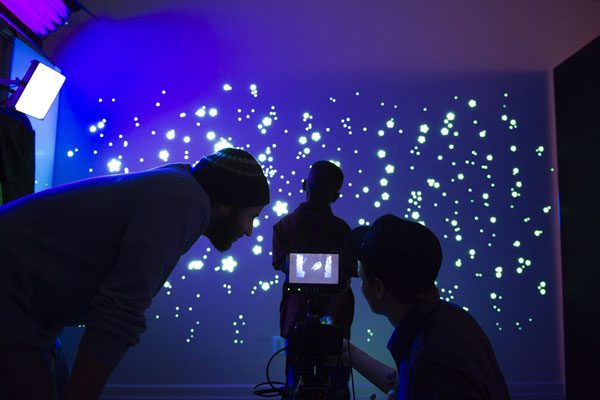New York-based producer, director, and “non-practicing lawyer” Reuben Atlas has filmmaking in the bloodlines and music frequently on his mind, so it’s perhaps no huge surprise that he wanted to combine the two interests when running across the all-in-the-family Hypnotic Brass Ensemble. The eight young men who make up the group are all sons of Phil Cohran, a legendary Chicago trumpeter who turned his back on commercial music to pursue astral jazz, proto-funk, and an Afrocentric lifestyle. Cohran’s ultimate avant-garde work, however, may have been his own sons, who were raised communally on Chicago’s South Side with Cohran and their two mothers, complete with homemade clothes, veganism, and alternative holidays.
Atlas’s documentary on those horn-playing sons, Brothers Hypnotic may be his first feature-length documentary but it doesn’t look it. Read on for more from Reuben on what drew him to these horn-playing brothers and, after some wariness on their parts at first, how he worked his way into their lives. “Lively, funny and at times philosophical,” wrote Andrew Barker in Variety, “Brothers Hypnotic tackles the challenges of maintaining an independent music career, as well as some knotted generational conflicts, and handles it all with great sensitivity.”
Have you any experience in music yourself? Play any instruments?
I play guitar and sing, and played in bands in high school and college. Mostly covers, mostly mediocre. These days I’m playing classical guitar and bluegrass for my 9-month-old daughter. I’m using the Hypnotic Brass Ensemble family playbook and starting lessons young. Right now, she’s really into the conga drum.
How’d you first learn about Hypnotic and how did this project come about?
I met the band like anyone else, in the streets of New York City. I was in my third year of law school, not really thrilled about the prospect of becoming a lawyer and heard this sound bouncing off buildings near Union Square. It sounded incredibly unique, so I followed it. Literally four or five blocks later, I found the band and was just floored. There’s a lot of great talents in New York on the street, but nothing like that, and nothing that big. So I just went up to them and started talking. At the time, I’d been working on videos for people unfairly incarcerated under the Rockefeller drug laws, and my mother was a filmmaker, so the idea of filmmaking was always in my head.
I said to the band, “Look, I’d love to make a video for you, to help you guys get gigs.” They sort of looked at me like, “Yeah, okay… we’re all right, we can get our own gigs.” I went home and saw that there was nothing online, no videos, so I came back and explained my idea for an EPK [electronic press kit] which they liked, but still said, “The best way you can support us is to buy a CD.” So I bought a CD, and came back the next day with a camera.
How did you gain their trust as a filmmaker so you could tell their story more intimately?
I had a certain sensibility about not pushing in places that the filmmaker instinct pushes you to go. They could tell that I wasn’t trying to pigeonhole their story, like “OK, here’s the brother that wants to sign the record deal, and he’s gonna get into a fight with the younger brother who’s all about the music.” Also, with the familial aspects of the story, I wanted them to feel like the film expressed their voice, and portrayed their family the way they wanted to be portrayed… from early-production through the edit, we maintained a running dialogue about the direction of the film.
And was Cohran worried about how he’d be portrayed in the film?
Not really. I think he just didn’t want his history sugar-coated.
They did a fair amount of travel in the time you covered. Was it difficult to follow them around, including getting the funds together, to go with them to Ireland for instance?
Luckily, I had ITVS funding in time for Ireland, but yes, once their travel increased, production became more expensive and difficult. They toured as the horn section for Gorillaz’s world tour in 2010. I had no funds at the time, and that felt devastating to miss.
What are some of your other favorite documentaries that you may have used for inspiration?
Let’s Get Lost, the classic Bruce Weber documentary about Chet Baker (edited by the great, Angelo Corrao!) is my favorite music documentary. My mother’s film, The Flashettes, about a girls track team in 1970s Bedford–Stuyvesant was also a big inspiration.
Can you tell us about what you’re working on next?
I’m in production on a film about the community organization, ACORN, which I’m co-directing with Sam Pollard. I’m also working on a film about the subculture surrounding old and rare wine.
